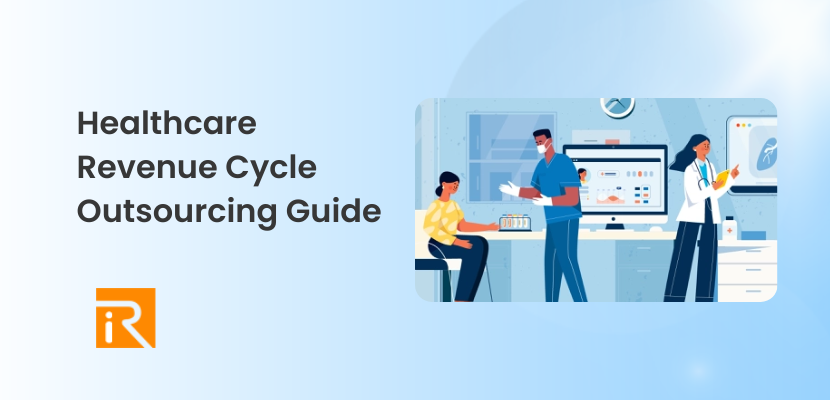The healthcare industry is constantly evolving, and it’s becoming increasingly difficult to keep up with the ever-changing landscape. In order to stay competitive and maintain financial stability, many healthcare organizations are turning to outsourcing their revenue cycle management. However, not all outsourcing partners are created equal, and it’s important to choose the right one in order to maximize your revenue and streamline your operations.
In this Healthcare Revenue Cycle Outsourcing Guide – 6 Things to Look for in a Partner, we’ll explore the top things to consider when choosing an outsourcing partner. From experience and expertise to technology and communication, we’ll cover it all. So, let’s dive in and find the perfect partner for your healthcare organization!
Experience and Expertise
Experience and expertise are essential qualities to consider when selecting a partner for revenue cycle management. A partner with extensive experience and expertise can help healthcare organizations optimize their revenue cycle management processes and maximize revenue performance.
Experience in revenue cycle management is critical because it provides the partner with the knowledge and skills to navigate the complexities of healthcare revenue cycles. An experienced partner can identify areas of improvement, implement best practices, and help healthcare organizations streamline their revenue cycle processes.
Expertise is also essential because it allows the partner to provide specialized knowledge and skills in specific areas of revenue cycle management. For example, a partner with expertise in coding and billing regulations can help ensure that claims are processed accurately and in compliance with regulations. Similarly, a partner with expertise in denial management can help healthcare organizations reduce the number of denied claims and increase revenue performance.
In addition to general experience and expertise, it’s also important to consider a partner’s experience and expertise in specific areas of healthcare. Revenue cycle management can vary depending on the type of healthcare organization, such as hospitals, physician practices, or other specialized healthcare providers. Therefore, working with a partner who has experience and expertise in the specific area of healthcare can be highly beneficial.
When selecting a partner for revenue cycle management, it’s important to consider their track record of success. A partner with a proven track record of success can help healthcare organizations achieve their revenue goals and improve their revenue cycle management processes.
Experience and expertise are critical components to consider when selecting a partner for revenue cycle management. An experienced and knowledgeable partner can provide valuable insights, implement best practices, and help healthcare organizations optimize their revenue cycle management processes. Furthermore, it’s essential to consider a partner’s experience and expertise in specific areas of healthcare to ensure that they are the right fit for your organization.
Technology and Infrastructure
Technology and infrastructure are essential components of any modern business, including healthcare organizations. In the context of revenue cycle management, technology and infrastructure play a crucial role in improving efficiency, accuracy, and overall revenue performance.
One of the primary benefits of utilizing technology in revenue cycle management is automation. Automated processes can help reduce manual errors, improve accuracy, and increase efficiency. For example, automated coding and billing processes can help ensure that claims are processed correctly and in a timely manner, reducing the risk of denied or delayed payments.
Another key aspect of technology and infrastructure in revenue cycle management is data analytics. Advanced analytics tools can help organizations identify trends, monitor key performance indicators (KPIs), and make data-driven decisions to improve revenue performance. For example, analyzing claims data can help identify patterns of denied claims, enabling organizations to take corrective action and prevent future denials.
In addition to automation and data analytics, technology and infrastructure can also enable better communication and collaboration among revenue cycle management teams. Cloud-based software solutions and other collaboration tools can help team members work together more efficiently and effectively, even when working remotely.
Finally, it’s essential to have a reliable and secure infrastructure to support revenue cycle management. This includes having robust hardware and software solutions, such as firewalls and antivirus software, to protect against security threats. It also means having redundant systems in place to ensure that critical data is always available and accessible, even in the event of a system failure or outage.
Technology and infrastructure are critical components of effective revenue cycle management. By leveraging automation, data analytics, and collaboration tools, healthcare organizations can improve efficiency, accuracy, and revenue performance. Furthermore, having a reliable and secure infrastructure is essential to ensure that critical data is protected and always available when needed.
Communication and Transparency
Communication and transparency are crucial aspects of effective revenue cycle management. Clear communication and transparency can help ensure that everyone involved in the revenue cycle management process is on the same page and working towards the same goals.
Effective communication is essential throughout the revenue cycle management process. This includes communicating with patients to help them understand their financial responsibility and payment options, as well as communicating with insurance companies and other third-party payers to ensure that claims are processed accurately and in a timely manner.
In addition to communication with external parties, it’s also important to have open and transparent communication within the revenue cycle management team. This includes sharing information about revenue performance, identifying areas for improvement, and working collaboratively to implement changes that can improve efficiency and revenue performance.
Transparency is also essential in revenue cycle management. Patients and other stakeholders need to have a clear understanding of the billing process, including the charges and fees associated with healthcare services. Transparency can help build trust with patients and reduce the risk of disputes or billing errors.
Furthermore, transparency is essential in ensuring compliance with regulations and ethical standards. Revenue cycle management teams need to be transparent in their billing practices and ensure that they are following all applicable laws and regulations. This includes ensuring that billing codes are accurate, charges are reasonable and customary, and that all payments and adjustments are properly documented and reported.
Effective communication and transparency are critical to successful revenue cycle management. By communicating clearly with patients and other stakeholders, and fostering open and transparent communication within the revenue cycle management team, healthcare organizations can improve revenue performance, build trust with patients, and ensure compliance with regulatory and ethical standards.
Compliance
Compliance with regulations and ethical standards is crucial in revenue cycle management (RCM) for healthcare organizations. RCM involves the processes of billing and collections of medical services, and any error or noncompliance can lead to legal and financial risks for the organization. Therefore, healthcare organizations must ensure that they comply with all regulations and ethical standards related to RCM.
The importance of compliance in RCM cannot be overstated. Compliance helps healthcare organizations avoid legal and financial risks that can arise from noncompliance. Noncompliance can result in penalties, fines, and even exclusion from government programs such as Medicare and Medicaid. Additionally, noncompliance can damage the organization’s reputation, leading to a loss of patients and revenue.
Partnering with a provider who has a strong commitment to compliance can provide significant benefits for healthcare organizations. A compliant partner can help the organization avoid legal and financial risks by ensuring that they comply with all regulations and ethical standards. Additionally, a compliant partner can provide expertise and knowledge on the constantly changing regulations, ensuring that the organization remains up-to-date and compliant.
A compliant partner can also help healthcare organizations save time and resources by managing RCM processes more efficiently. By using advanced technologies and streamlined processes, a compliant partner can reduce errors and improve accuracy, resulting in faster payments and reduced denials.
Compliance with regulations and ethical standards is critical in RCM for healthcare organizations. Partnering with a provider with a strong commitment to compliance can help organizations avoid legal and financial risks, improve efficiency, and maintain their reputation. It is essential for healthcare organizations to prioritize compliance in their RCM processes to ensure their long-term success.
Customization and Flexibility
Customization and flexibility are crucial elements in revenue cycle management (RCM) for healthcare organizations. RCM involves a wide range of processes, from billing and coding to collections and reimbursement. Each healthcare organization has unique needs and requirements that require a tailored approach. Therefore, it is essential to partner with a provider that can provide customized and flexible solutions to meet those needs.
The importance of customization and flexibility in RCM cannot be overstated. Customization allows healthcare organizations to streamline their RCM processes and improve efficiency. By tailoring their services to the unique needs of the healthcare organization, a provider can ensure that they are providing the most effective solutions for the organization’s specific challenges. This can lead to faster payments, reduced denials, and improved revenue cycle performance.
Partnering with a provider that can tailor their services to the unique needs of the healthcare organization provides significant benefits. A provider that can customize their solutions can provide more personalized services, addressing the specific pain points of the organization. This can lead to improved communication, increased trust, and a better overall partnership.
Flexibility is also important in RCM. The healthcare industry is constantly evolving, and organizations must be able to adapt to those changes quickly. A flexible partner can help healthcare organizations stay up-to-date with the latest industry trends and regulations. They can also adapt their services to changes in the organization’s needs, such as shifts in patient demographics or changes in the organizations financial.
Cost and return on investment (ROI)
Cost and return on investment (ROI) are important considerations when it comes to outsourcing revenue cycle management. Healthcare organizations need to ensure that they are getting value for their money and that outsourcing their revenue cycle management is financially feasible.
Outsourcing revenue cycle management can provide significant cost savings for healthcare organizations. A reputable revenue cycle management partner can leverage economies of scale and advanced technology to optimize revenue cycle processes and reduce costs. This can include streamlining billing and coding processes, improving claims submission accuracy, and reducing denials and rejections.
In addition to cost savings, outsourcing revenue cycle management can also lead to improved revenue performance. A specialized revenue cycle management partner can use their expertise and knowledge to identify and address revenue cycle inefficiencies and opportunities for improvement. This can include identifying underpayments and missed charges, reducing claim denials, and improving cash flow.
To evaluate the ROI of outsourcing revenue cycle management, healthcare organizations need to consider both the costs and the benefits. The costs can include the fees charged by the revenue cycle management partner, as well as any internal costs associated with transitioning to an outsourced model. The benefits can include cost savings, improved revenue performance, and increased efficiency.
One way to evaluate the ROI of outsourcing revenue cycle management is to calculate the cost savings and revenue improvements that result from the partnership. For example, a healthcare organization might calculate the reduction in denied claims or the increase in collections as a result of working with a revenue cycle management partner. These benefits can be compared to the costs of the partnership to determine the ROI.
In conclusion, effective revenue cycle management is essential for healthcare organizations to maximize their revenue performance, improve efficiency, and ensure compliance with regulatory and ethical standards. Outsourcing revenue cycle management can be a valuable solution for healthcare organizations looking to optimize their revenue cycle processes. When selecting a partner for revenue cycle management, it’s essential to consider factors such as experience, expertise, technology, infrastructure, communication, and transparency. By partnering with a reputable and experienced revenue cycle management provider, healthcare organizations can benefit from specialized knowledge and skills, advanced technology, and efficient processes. Furthermore, effective communication and transparency are critical to building trust with patients and ensuring compliance with regulations. Overall, outsourcing revenue cycle management can be a strategic investment for healthcare organizations seeking to optimize their revenue cycle processes and achieve their revenue goals.

















